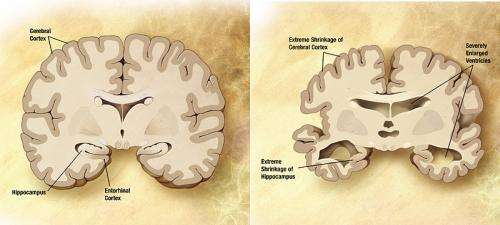Combination drug treatment reduces agitation for patients with probable Alzheimer's disease

In a preliminary 10-week randomized trial, patients with probable Alzheimer disease who received the combination medication dextromethorphan-quinidine demonstrated less occurrences and severity of agitation, compared to patients who received placebo, according to a study in the September 22/29 issue of JAMA.
Agitation and aggression are highly prevalent in patients with dementia and are associated with distress for patients and caregivers, greater risk of institutionalization, and accelerated progression to severe dementia and death. Nonpharmacological interventions are recommended as first-line therapy, but many patients fail to respond. Although many classes of psychotropic drugs are prescribed for agitation, safety concerns and modest or unproven efficacy limit their use, according to background information in the article.
The combination of the drugs dextromethorphan hydrobromide and quinidine sulfate is approved for the treatment of pseudobulbar affect (a neurologic disorder characterized by episodes of emotional displays such as crying), and there is evidence suggesting a potential benefit of these drugs for agitation. Jeffrey L. Cummings, M.D., Sc.D., of the Cleveland Clinic Lou Ruvo Center for Brain Health, Las Vegas, and colleagues randomly assigned 220 patients to receive dextromethorphan-quinidine (n = 93) or placebo (n = 127) in stage 1. In stage 2, patients receiving dextromethorphan-quinidine continued; those receiving placebo were stratified by response and re-randomized to dextromethorphan-quinidine (n = 59) or placebo (n = 60). The 10 week trial was conducted at 42 study sites.
A total of 194 patients (88 percent) completed the study. Analysis combining stages 1 (all patients) and 2 (re-randomized placebo nonresponders) showed significantly reduced measures of agitation (occurrence and severity of symptoms). Patients treated with only dextromethorphan-quinidine had an average 51 percent reduction in the measure of agitation from baseline to week 10, compared with 26 percent for those treated with only placebo.
Adverse events included falls (8.6 percent for dextromethorphan-quinidine vs 3.9 percent for placebo), diarrhea (5.9 percent vs 3.1 percent, respectively), and urinary tract infection (5.3 percent vs 3.9 percent, respectively). Serious adverse events occurred in 7.9 percent with dextromethorphan-quinidine vs 4.7 percent with placebo. Dextromethorphan-quinidine was not associated with cognitive impairment or sedation.
"These preliminary findings require confirmation in additional clinical trials with longer treatment duration," the authors write.
Pending further evidence, there is a reasonably strong case to prioritize dextromethorphan-quinidine as an off-label treatment for agitation, possibly as a safer alternative to atypical antipsychotics, writes Anne Corbett, Ph.D., of King's College London, and colleagues in an accompanying editorial.
"However, while further studies are conducted to verify the efficacy and safety of this approach, it will be important to achieve a robust international expert consensus regarding the prioritization of potential treatments for agitation in patients with dementia to improve the consistency of clinical practice. This approach also must understand and incorporate patient and caregiver views regarding the evaluation of risk and benefits in relation to these treatments."
More information: JAMA, DOI: 10.1001/jama.2015.10214
JAMA, DOI: 10.1001/jama.2015.10215

















